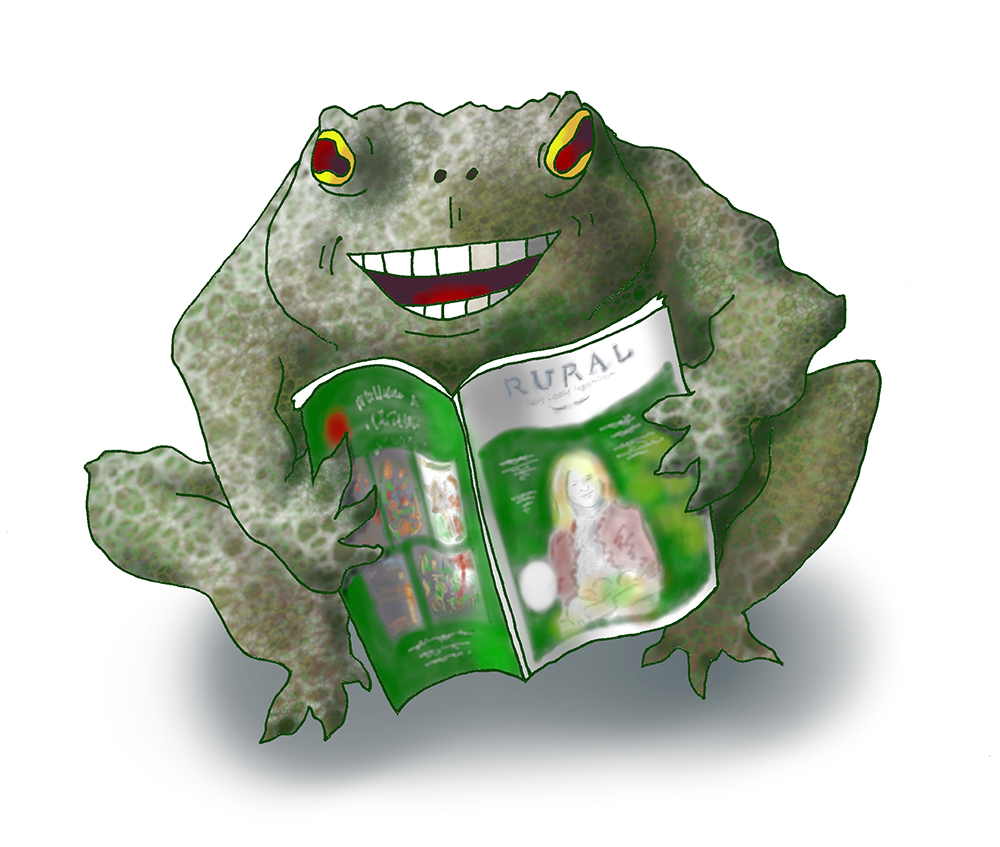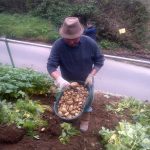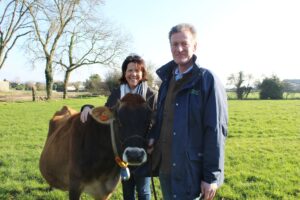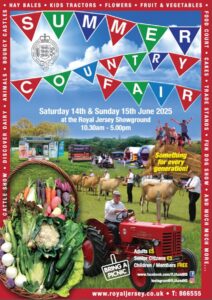We continue our series of article in Jèrriais – Jersey’s own traditional native language.
The ‘frouque’ in question is a digging fork, rather than a table fork. An English translation follows.


Ou ch’est-i la tèrre auve tch’i qu’j’avons eune alliance politique?
Par Jean Treleven
La Grand’-Tèrre
Tch’est qu’ou comprannez par l’expression ‘La Grand’-Tèrre?’
En Jèrriais, la pathôle, Grand’-Tèrre, veurt dithe, La Nouormandie, mais en Angliais, quand j’faîthons sèrvi la pathôle, ‘Mainland’, ch’na veurt dithe, L’Angliétèrre et si j’voulons pâler d’la France ch’est ‘The Continent.’
Bein seu, j’faîthons tous partie du continnent d’Ȗrope, mais tch’est qu’chenna veurt dithe ‘Mainland?’
Ch’est-i la tèrre la pus proche?
La terre d’eyou qu’nouot’héthitage tchultuthel veint?
Eh bein, Jèrri et Dgèrnésy, eyou qu’i’sont? En Angliais j’sommes ‘Les Îles dé la Manche, ‘The Channel Islands,’ mais je’n’sommes pon dans La Manche, j’sommes au sud dé la Manche dans la Baie d’St Malo. Les Français l’savent bein et nos appellent, Les Îles Anglos-Nouormandes.
Les rotchièrs de Jèrri font partie d’la région géologique Armorique, ch’na veurt dithe la Brétangne et lé Vouêt d’la Nouormandie – Lé Cotentin.
Duthant l’âge dé gliaiche, Jèrri faîthait partie du continnent et les preumié pèrsonnes vîntent du Sud, en siêthant l’s éléphants laineurs.
I’y’a douze mille ans, la mé haûchit et les liains phŷsiques fûtent copés, mais pon les cheins humains.
D’abord ch’fut les pèrsonnes Néolithiques tch’apportîtent l’agritchultuthe et tchi bâtiîtent les dolmens. Pu tard vîntent les tribus d’l’âge dé bronze et d’l’âge dé fé. Les pièches dé sou trouvées à ches drein dans ‘l’Anichette du Câtillon’ nos montrent les liains tch’existaient auve des endraits en Nouormandie et en Brétangne – les Coriosolîtes d’la région de Courseul, les Baiocasses d’la région de Bayeux et les Redones d’la région de Redon.
Mais ch’est les Nouormands tchi nos donnîtent not’ chultuthe pèrpétuelle.
Au dgiezième siècl’ye, Rollo griyit La Nouormandie alentou d’Rouën, rallouongnie preumiéthement à Bayeux et en neu chent trente-trais, au Cotentîn et à nos Îles. Rollo et san fis Dgillaume Longue Êpée apportîtent lus système dé justice auve les justicièrs, les louais et les cours tchi continnuent en partie jusqu’aujourdaniet.
Sans doute ch’fut nouot’s’pathâtion politique d’La Nouormandie en douze chent quatre, tchi donnit à Jèrri nouot’gouvèrnément îndépendant et griyit des forts liains auve lé Duc d’la Nouormandie Jean, tchi t’ait achteu rouai d’Angliétèrre étout.
D’abord I’n’y eut pon d’grands changements, j’restêmes Nouormands, mais êventuellement, l’Angliais c’menchit à rempliaichi l’Jèrriais et l’Français dans l’s êcoles, l’s Êtats et l’s églyises. Les livres et les cantiques, et même les bâtisses et lé mangi d’vîntent pus Angliais.
Aniet l’s înfluences tchultuthelles né sont pon raîque Nouormandes, Angliaîches et Françaises mais Italiennes, Portûndgaises, Polonnaises, Roumaines étout. Jèrri est véthitabliément un endrait multitchultuthel.
I y’avait d’s années quand les liains politiques auve L’Ȗrope renforchîtent, quand L’Rouoyaume Unni faîthait partie d’la commeunauté Ȗropéenne mais pon pouor pus longtemps !
La Nouormandie reste la tèrre la pus proche dé Jèrri et l’origine d’nouot’identité tchultuthel. Aniet les liains de gouvèrnément, sont pus auve lé Rouoyaune Unni, mais La Nouormandie s’sa tréjous ‘La Grand’-Tèrre.’
In translation:
The Mainland
What do you understand by the expression ‘The Mainland?’
In Jèrriais, the term ‘La Grand’-Terre’ means Mainland and refers to Normandy, whereas in English, when we use the term ‘Mainland,’ it means England and if we want to refer to France we use the term ‘The Continent.’
Of course we are all part of the continent of Europe, but what is the meaning of ‘Mainland.’
Is it the land that is the closest?
Is it the land from where our cultural heritage come?
Or is it the land with which we have political ties?
So, where are Jersey and Guernsey? In English we are called the Channel Islands but we are not in the Channel, we are South of the Channel in the Bay of St Malo. The French understand this and call us ‘The Anglo-Norman Islands.’
Jersey’s rocks form part of the geological region of Armorica which includes Brittany and Western Normandy – The Cotentin.
During the Ice Age, Jersey was joined to the continent and the first people came here from the South, following the woolly mammoth.
Twelve thousand years ago, the sea level rose, cutting the physical ties with the continent but not the human links. Firstly the Neolithic people came, bringing agriculture and building dolmens. Then came the Bronze and Iron Age tribes. The coins found recently in the Le Catillon hoard, clearly show the links with places in Normandy and Brittany – The Coriosolites from Courseul, The Baiocasses from Bayeux and The Redones from Redon.
But it was the Normans who gave us the culture that was to last.
In the tenth century, Rollo created Normandy around Rouen, extending first to Bayeux then in 933 to the Cotentin and our Islands. Rollo and William Longsword brought us our system of Justice with Jurats, Laws and Courts which have remained in part, right up to today.
Without doubt it was our political separation from Normandy in 1204 which gave Jersey our independent government and created strong links with our Duke of Normandy, John, who was now also King of England.
At first, not much changed and we remained Norman, but eventually English began to replace Jèrriais and French in the schools, the States, the Churches, Books and Hymns and even buildings and food became more English.
Today our cultural influences are no longer just Norman, English and French but also Italian, Portuguese, Polish and Romanian. Jersey is truly a multicultural island.
For some years now, the political ties with Europe have strengthened, while the United Kingdom was part of the European Community, but not for much longer.
Normandy remains the land the closest to Jersey and the origin of our cultural identity. Today we have more government links with the United Kingdom but Normandy will always be ‘The Mainland,’ ‘La Grand’-Terre.’





